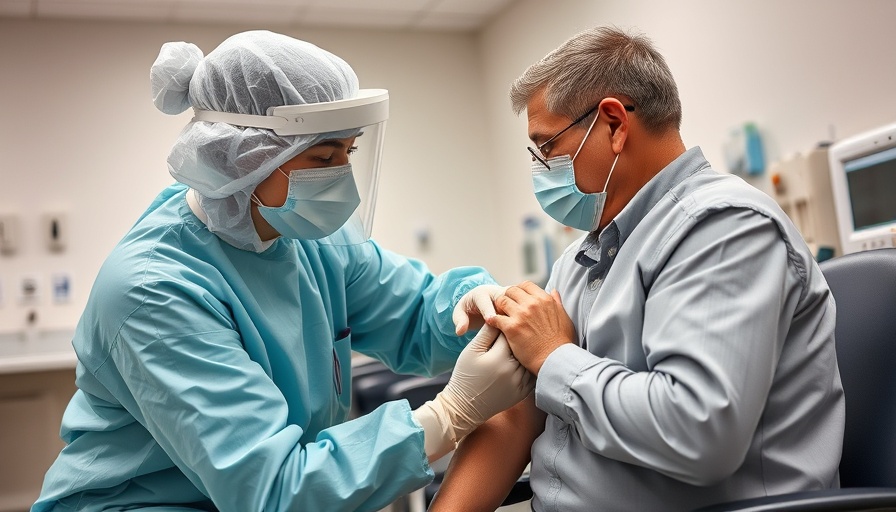
The Role of Nutrition in Managing Parkinson’s Disease
Parkinson’s disease (PD) is more than just a movement disorder; it involves a complex interplay of symptoms that can affect an individual’s nutritional status. One of the most critical aspects of managing PD is understanding how diet, particularly protein intake, can influence both physical health and the progression of the disease. In the context of Brazil, where the study highlights that only 38% of elderly people adequately consume protein-rich foods, it becomes clear that there's a vital need for nutritional awareness among Parkinson's patients. Improving diet quality can play a critical role in mitigating symptoms associated with PD, including the risk of sarcopenia—a condition characterized by muscle loss.
Understanding Sarcopenia and Its Implications
Sarcopenia, as seen in the Brazilian study, is prevalent among patients with mild to moderate PD. With 51% of participants screening positive for this condition and 35% demonstrating low protein intake, the implications extend beyond mere nutritional deficiencies. Sarcopenia not only exacerbates motor symptoms but also significantly impacts the overall quality of life. The study utilized the SARC-F score to assess the risk taking a closer look at muscle strength, confirming that patients with low protein intake were more likely to experience a decline in lean body mass. As we age, especially with conditions like PD, prioritizing protein becomes essential for maintaining mobility and functionality—key factors in quality aging.
The Benefits of Protein for Longevity
Integrating protein-rich foods into the diet can provide multiple benefits. Research has shown that adequate protein intake is fundamental not only for muscle health but also plays a significant role in maintaining energy levels and overall vitality. Anti-aging supplements often highlight the importance of protein as a vital nutrient that supports muscle mass, thus preventing or slowing down conditions like sarcopenia. Longevity vitamins, including certain amino acids, help enhance resilience against age-related muscle loss, marking protein as an essential ally in the journey of graceful aging.
How to Optimize Protein Intake
It might not be intuitive for everyone, but optimizing protein intake can be quite straightforward. Here are several actionable insights aiming to help PD patients achieve adequate protein consumption:
- **Meal Distribution**: It's advised to space meals and redistribute protein intake throughout the day. This can help in maximizing amino acid availability and improving the effectiveness of drugs like levodopa, which are crucial for managing PD symptoms.
- **Incorporating Diverse Sources**: Including various protein sources—such as lean meats, legumes, tofu, and nuts—can help improve compliance and overall nutritional quality. Omega-3 for longevity, for instance, is highly beneficial and can be found in fatty fish or flaxseeds while offering anti-inflammatory properties that can aid in symptom relief.
- **Engagement with Healthcare Providers**: Regular consultations with a nutritionist or dietitian can ensure individual dietary needs are met, particularly during the progression of PD.
Broader Impacts on Longevity and Health
Beyond just protein, incorporating a holistic approach to dietary habits that combine anti-aging supplements like NAD+ and resveratrol may support overall wellness. Resveratrol benefits have been extensively researched, indicating its potential to impact aging at a cellular level while also promoting cardiovascular health. Additionally, leveraging collagen for aging and employing adaptogens can enhance resilience to stress and contribute to overall health stability, which is crucial during the unpredictability of chronic diseases like PD.
Future Directions and Research
As ongoing research sheds light on the link between nutrition and neurodegenerative diseases, it's clear that dietary interventions should be personalized and emphasized in patient care strategies. Continued studies focusing on diet, protein intake, and body composition will be important in developing preventive and therapeutic approaches to manage Parkinson’s disease effectively. The growing understanding of how specific nutraceuticals and dietary patterns can optimize health could profoundly affect the quality of life for individuals with chronic conditions, paving the way for improved management strategies in the future.
In conclusion, raising awareness around protein intake and nutritional practices not only impacts the immediate health of PD patients but can significantly contribute to the concept of aging gracefully—an essential narrative in today's health discourse.
 Add Row
Add Row  Add
Add 




Write A Comment